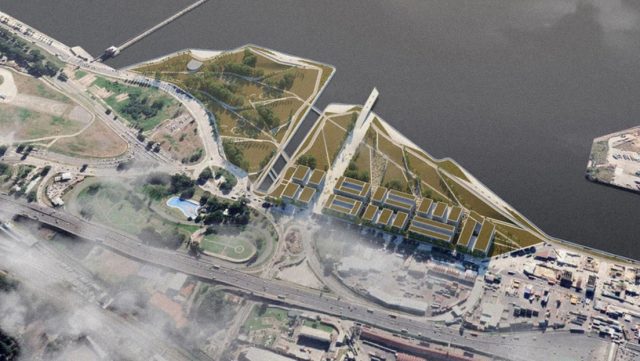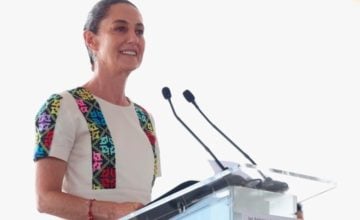At the beginning of December, the Legislature of the City of Buenos Aires, (Argentina), with a majority aligned to former President Mauricio Macri, authorized two projects on the use of land in different stretches of the Río de La Plata coast, contemplating the installation of public parks in most of the space, but also the sale of hectares to private hands and the construction of luxurious buildings.
The first proposal, widely repudiated by Peronism, the left and environmental groups, proposes the ‘rezoning’ in two sectors of the northern stretch of the Costanera: Punta Carrasco and Costa Salguero. These are public lands that, in practice, were not, since they were concessioned to private parties decades ago, operating discos, business offices and event halls.
The new Argentine legislation stipulates that of the almost 30 hectares between the two lands, 25 will be used for green and public spaces, while the rest could be commercialized. In this specific sector, the construction of modern buildings with up to 24 meters in height, intended for homes, offices, shops or other types of private spaces is planned.
The initiative has already been approved with 36 votes in favor and 22 against. In any case, there is still a current court ruling declaring the sale of riverside land unconstitutional. The city executive must reverse this resolution if it intends to finalize any ‘transaction’ on this matter, and has already filed an appeal, explains Leandro Lutzky in a report for RT.
For their part, the detractors demand that the entire land be used as a large public park, rejecting real estate deals. In fact, Peronism gathered more than 53,000 signatures for the Legislature to deal with the proposal next year that 100% of the area be for everyone, as a popular initiative.
Now, the process is being analyzed by the Superior Court of Justice (TSJ), and if it has the approval, it will go to the Constitutional Affairs Commission. Likewise, the macrismo has the majority of the votes in the Legislative.
The Sports City, which did not become a reality
Controversy also arose in the southern sector of the Costanera: the Legislature approved – with 36 votes in favor, 20 against and two abstentions – an agreement with IRSA, the construction giant, to use the 70 hectares of what was to be the desired Sports City of Boca Juniors.
It is a site where the most popular club in Argentina was going to build innovative recreational sites, in addition to a huge stadium, something that never happened. The place was abandoned, adrift, and was sold to a private in 1992 and later, in 1997, it was bought by IRSA.
Now, this firm has the legislative backing to set up, on that site, a neighborhood of imposing towers, which will be called Costa Urbana. According to the company itself, the territory will have «shops, offices, hotels, sports clubs and yachts». This, in addition to green areas, will have other spaces «for support services, such as schools, supermarkets and parking lots». In the end, it is a continuation of the Puerto Madero area, the most exclusive urban development in the city, next to the widest river in the world.
In this regard, the ruling party promises that 50 hectares of the total would be used for public space. They also count on the company to give financial compensation to the Sustainable Urban Development Fund.
Cross opinions in Argentina
In the party led by the governor, Horacio Rodríguez Larreta – with serious presidential aspirations – they defend the modifications under the premise that combining the public with the private would be the best way to take advantage of the land.
In fact, the president of the Urban Planning Commission, Daniel del Sol, argued that the determination on the Costanera Norte aims to «generate a large area of green space with public access and an area in which urban projects can be done with a mixture of uses for the development of the city on the border of the coast». According to the Macrismo in Buenos Aires, this would guarantee the circulation of people.
Regarding the territory in the southern part of the Argentine capital, Del Sol pointed out that he wants to «recover, renovate and develop a vast unused land», where the population did not have access to it.
On the other hand, legislator Claudia Neira tells RT that «there were not even environmental impact studies prior to this agreement with IRSA». This, considering that more than half of the 71 hectares «is land reclaimed from the river», points out Neira. «There are swamps and vegetation, everything must be evaluated», she emphasizes.
Likewise, the deputy of the Frente de Todos – akin to the president, Alberto Fernández – questions that the planned entrance to the river in Costa Urbana «is going to have a very reduced access for citizens, with an entry by one side of the buildings».
Currently, the porteños have few public spaces to enjoy the Río de la Plata. This is something very different from what happens with the beaches of Montevideo (Uruguay), or what happened in Buenos Aires itself in 1918, when the Municipal Spa for the popular classes was inaugurated, now extinct.
«It is not understood what is the interest of the State»
Neira also criticizes that the construction of luxurious properties has been authorized when the capital faces a high housing deficit: «They want to build a neighborhood with similar characteristics to Puerto Madero, which today is 50% unoccupied». And she adds: «It is not understood what is the interest of the State to promote this type of housing».
For the interviewee, the City Government does not participate in the planning of real estate construction or urban development: «For a long time, 70% of the houses that are built are luxury. In general, they are idle, because they are used as a store of value, to invest in bricks”, she describes. «This lack of planning makes us have an increasingly inaccessible housing market, because there is no supply for the middle sectors of the population», she adds.
From her political caucus in Parliament, they argue that «the construction of social housing is the most obvious answer», although this policy «has been abandoned». Another good option would be to build properties to influence the rental market, she says, while many tenants are struggling to make ends meet, faced with unpayable prices. «We have proposals to buy buildings that are at low value, and put the houses up for rent», she remarks.
She even comments on a variant of the agreement with the construction company: «They can be offered to build square meters in other places. That they invest in housing for the middle sectors, who need a home, and the City needs more offers for these sectors».
Demonstrations in Argentina
During the last months, thousands of citizens in Argentina have protested against the initiatives of the Executive. These demonstrations were carried out by opposition parties, social movements and environmental groups, who expressed their desire to improve access to the river for all citizens.
In addition to demonstrations in the streets, the Public Hearing for the Costanera Norte lands, which ended in January and lasted two months, had 2,057 speakers: 97% rejected the official project. Although what was pronounced in that instance is not mandatory, for environmentalists there is an «undemocratic» attitude of the city government, which is advancing with its plan despite the overwhelming refusal.
On Thursday of last week, there was another demonstration in front of the Argentine Legislature, with hundreds of protesters and banners contrary to the bills. The voting had to take place behind closed doors, with fences and a police cordon.











